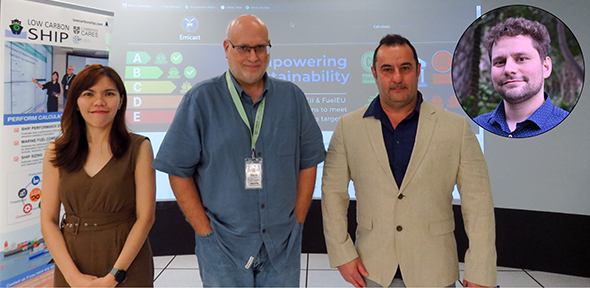
With the climate impact of shipping increasingly under the spotlight – accounting for around 3% of greenhouse gas (GHG) emissions worldwide – researchers from Cambridge and Singapore have launched a start-up that aims to visualise shipping emissions and help improve the design of future ships.
Our aim is to leverage big data and novel modelling techniques put forward at Cambridge CARES to support new low-carbon ship design but also to monitor, forecast and optimise ship and engine operation.
Dr Savvas Gkantonas
Using novel modelling techniques and data, EMICAST aims to empower maritime stakeholders such as shipowners and operators to optimise both operational efficiency and profitability, while adhering to regulatory standards – streamlining emissions compliance in the process.
The spin-out has been founded by Dr Li Chin Law from the Cambridge Centre for Advanced Research and Education (CARES) and Dr Savvas Gkantonas from Cambridge’s Department of Engineering, with Professor Epaminondas Mastorakos acting as Scientific Adviser.
It comes at a time when the International Maritime Organization (IMO) has announced its aims for a sectoral target of net zero greenhouse gas emissions from international shipping to be reached by or around 2050.
“This can be achieved in various ways, such as by improving ship design and combustion systems; transitioning away from fossil fuels; optimising energy efficiency of ships; capturing CO2 from the exhaust; and investing more in innovative solutions,” said Dr Law.

The co-founders of EMICAST, pictured, from left: Dr Li Chin Law, Professor Epaminondas Mastorakos, Mr Charalambos Soultatis, and Dr Savvas Gkantonas (inset). Credit: Cambridge CARES.
EMICAST has been created with the primary goal of providing comprehensive services encompassing carbon accounting, reporting, and emissions forecasting to accurately quantify GHG intensities and the associated potential penalties.
“What we are aiming to offer with EMICAST is advanced visualisation of ship emissions through rigorous carbon accounting and forecasting techniques powered by machine learning algorithms,” said Dr Law. “Through the deep knowledge of alternative low-carbon fuels and novel propulsion systems, EMICAST can also help with the design of future ships.”
The initiative behind EMICAST has its roots in scientifically published models of alternative fuels and the impact of these fuels on ship propulsion systems. Some of these models were made available in the first iteration of a maritime fuel calculator. This calculator provided insights into the performance of ships powered by low-carbon alternatives.
It became practical to visualise and project GHG intensities relative to decarbonisation timeframes, before any action could be taken to improve a ship’s carbon rating. Subsequently, with EMICAST, timely low-carbon solutions can be tailored to individual ships, ensuring emissions compliance while safeguarding operators’ profitability.
Professor Mastorakos said: “Maritime decarbonisation is not easy. Many solutions have been proposed such as hydrogen, ammonia, methanol, e-fuels, biofuels, and on-board carbon capture, and each has its own strengths, weaknesses, and technological, financial and supply chain bottlenecks.
“Over many years, the research at Cambridge CARES on many of these technologies has resulted in better understanding of the underlying concepts, such as lifecycle analysis; how ammonia burns in an engine; and how carbon capture can be implemented with on-board blue hydrogen production.
“EMICAST has been founded with the aim of helping the industry pick the most suitable decarbonisation solution based on their particular routes, ships and propulsion systems. Data analytics and modelling are used to develop quantitative strategies for minimising emissions.”
Dr Gkantonas said: “Big data acquisition and analytics are crucial for shipping and they are supported by many ongoing developments on automated tracking and on-board sensing systems. Our aim is to leverage big data and novel modelling techniques put forward at Cambridge CARES to support new low-carbon ship design but also to monitor, forecast and optimise ship and engine operation.”
Dr Law added: “A thorough understanding of various solutions, from thermodynamics to technological intricacies, ensures the design of a low-carbon ship that is truly efficient.”
This research is supported by the National Research Foundation, Prime Minister’s Office, Singapore under its Campus for Research Excellence and Technological Enterprise (CREATE) programme.
Adapted from a Cambridge CARES news article.

